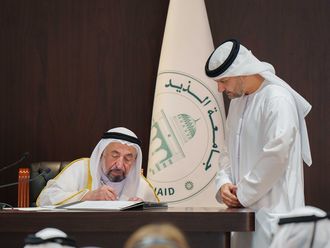Abu Dhabi
The UAE will be among the top performers in education if it introduces reforms to the educational system to prepare students for a world in which their lives will be affected by issues that transcend national boundaries, a prominent educationist said on Monday.
“Success will go to those individuals and nations that are swift to adapt, slow to complain, and open to change. The task for educators and policy makers is to ensure that countries rise to this challenge. In the global economy, the benchmark for educational success is no longer merely improvement by local or national standards, but the best performing education systems internationally,” Andreas Schleicher, Special Advisor on Education Policy to the Organisation for Economic Co-operation and Development OECD’s Secretary-General and Deputy Director for Education, told the majlis of His Highness Shaikh Mohammad Bin Zayed Al Nahyan, Crown Prince of Abu Dhabi and Deputy Supreme Commander of the UAE Armed Forces.
Schleicher stressed that now schools need to prepare students for a world in which most people will need to collaborate with people of diverse cultural origins, and appreciate different ideas, perspectives and values; a world in which people need to decide how to trust and collaborate across such differences; and a world in which their lives will be affected by issues that transcend national boundaries.
“Increasingly diverse and interconnected populations, rapid technological change in the workplace and in everyday life, and the instantaneous availability of vast amounts of information mean that all work that can be automated or digitized can now be done by the most effective and competitive individuals or enterprises, wherever on the globe they are located. Knowledge and skills have become the global currency in the 21st century,” Schleicher said.
Schleicher argued that when you could still assume that what you learned in school will last for a lifetime, teaching content and routine cognitive skills was at the centre of education. Today, where you can access content on Google, where routine cognitive skills are being digitised or outsourced, and where jobs are changing rapidly, the focus is on enabling people to become lifelong learners, to manage complex ways of thinking and complex ways of working and to live in a multi-faceted world as active and responsible citizens.
Schleicher said that placing a high value on education is just part of the equation. “Another part is the belief in the possibilities for all children to achieve. Interestingly, many of the world’s top performing school systems combine strong and equitable performance, in the sense that students from all social backgrounds do well. High performing school systems also share clear and ambitious standards across the board. Everyone knows what is required to get a given qualification,” Schleicher said.
He added some of the world’s most advanced education systems have far greater levels of income inequality and social heterogeneity than, for example, the United States. Their education systems are able to moderate inequalities because they attract the most talented teachers to the most challenging classrooms and the most capable school leaders to the most disadvantaged schools, thus challenging all students with high standards and excellent teaching. They foster new forms of educational provision that take learning to the learner in ways that allow students from all backgrounds to learn in the ways that are most conducive to their progress. The goal of the past was standardization and conformity; now it’s about being ingenious, about personalizing educational experiences.
Schleicher emphasied that modern education is about enabling professional autonomy within a collaborative culture.
“In the old bureaucratic education system, teachers were often left alone in classrooms with a lot of prescription what to teach. The best performing education systems set ambitious goals, are clear about what students should be able to do, and then provide teachers with the tools to establish what content and instruction they need to provide to their individual students. The past was about delivered wisdom; the future is about user-generated wisdom.
In the past, the policy focus was on the provision of education; today it’s on outcomes, shifting from looking upwards in the bureaucracy to looking outwards to the next teacher, the next school.
Schleicher said the past emphasised school management; now it is about leadership, with a focus on supporting, evaluating and developing teacher quality as its core, which includes coordinating the curriculum and teaching program, monitoring and evaluating teacher practice, promoting teacher professional development and supporting collaborative work cultures.












